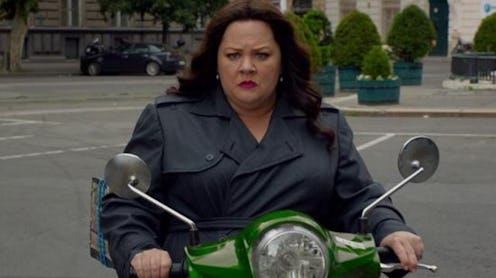Entertainment
'Spy' Is More James Bond Than Paul Feig

Bridesmaids seems now like a logical entry to feature filmmaking for Paul Feig, the heart and mind behind our beloved “growing-up” series Freaks and Geeks, and the new Melissa McCarthy comedy Spy . Although he had, in fact, helmed three pictures prior to the tremendously successful Kristen Wiig vehicle, we’ve effectively ret-conned his cinematography to begin with his first big winner. But, with his latest outing, Spy, Feig is paying attention to plot — not a bad thing, per se, when it comes to a director, but it's an unfamiliar focus for those looking to identify with Spy as much as they did with Bridesmaids.
Ever since Bridesmaids, which incepted a new energy into the “Yes, of course women can be funny” conversation, Feig has all but made it his mission to reformat traditionally male-centric subgenres — gross-out comedy, buddy cop, secret agent, ghostbuster — with a feminist edge. A more accurate way of putting his mission statement would be to say that he is aiming to normalize the idea of female actors and characters at the center of these types of films for wide American ingestion. We saw this issue rear its head just a tad in The Heat, a movie that has way more going on in the way of twist and turns than it ever really needed to. But The Heat rarely let its ambitious plot construction overshadow its real draw: the comic dynamic between McCarthy and her screen partner Sandra Bullock.
Just about every set piece, even those designed to introduce new components of the rapidly expanding crime caper, lent to an illustration of why reckless McCarthy and uptight Bullock made for material worth watching. Spy doesn’t quite reach the same honor. Part of it might be the fact that McCarthy plays a self-effacing dork, more closely reminiscent of her Gilmore Girls routine than the wildcard shtick that has made of her a big screen draw. Part of it might be the absence of a level comic foil. McCarthy does great work playing against Rose Byrne and Jason Statham alternatively, and they as well against her, but the lack of a straight man like Bullock’s Heat character leaves the new film wanting for its predecessor’s comedic chemistry.
Really, however, these issues are secondary to Spy’s preoccupation with its least interesting, albeit titular, avenue. McCarthy is thrust into a tangled web of espionage tropes: hidden bombs, double agents, tricky getaways, close-combat fights, yadda yadda yadda. It all amounts, really, to setup. With every one of Feig’s delicately woven scenes, I repeated the question, “How is this classic secret agent sequence going to afford McCarthy her next big laugh?” I was answered with the gradual revelation that these sequences are in fact in service of something else: Feig’s will to prove that his team can pull off an apt spy movie.
But Feig shouldn’t feel he has something to prove, on behalf of himself or of his circle of muses. We can see why he’s driven to set the stage for McCarthy, Byrne, Bullock, Wiig, Kate McKinnon, and Leslie Jones to show off their capabilities in every realm of pop fiction imaginable — after all, it’s not only comedy that the hyper-vocal blockheads of America think women can’t do — but it’s not an especially good idea to set such stages when you yourself don’t seem to know exactly where all the props go. Female-led cop flicks and spy films are wanting for genuine reverence, but perhaps the well-meaning Feig isn’t the artist to win it for them.
What he and his assembly of paramount comic prowess can do instead is, plain and simple, what they’re best at. They can take the police force, the CIA, and the parapsychology industry, and do the best thing they can with the lot: Use them as stepping-stones to the laughter. You can do your best to make good cop films and spy movies for, and with, your heroines, Feig, but you, they, and we will all be better off if the bunch of you just focus on making good comedies.
Image: 20th Century Fox